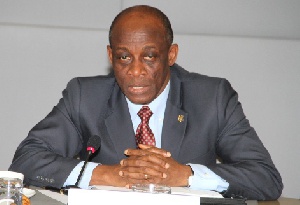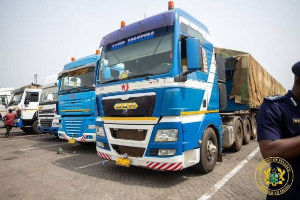The Minister of Finance, Seth Tekper, has said the medium term growth and economic prospects look bright and the fiscal consolidation programme being pursued by government is yielding positive results.
"The growth of the economy is expected to improve significantly in the medium term when the oil production from the Jubilee, TEN and Sankofa-Gye Nyame Fields come on stream," he said.
Briefing the media on the performance of the economy for 2015, on the theme, "Ghana - The Turn Around Story," in Accra yesterday, Mr Tekper said the fiscal deficit, which stood at negative 11.5 per cent in 2012, had been reduced provisionally to 7 per cent in 2015.
"The fiscal balance, which stood at negative 11.5 is projected to be reduced to negative 5.3 per cent this year, and the primary balance, which stood at negative 8.2 in 2012 for the first time since 2005, is projected to be reduced to 1.3 per cent this year," he stressed.
Highlighting on some of the key achievements in the consolidation programme being pursued by government, Mr Tekper said government had cleared all wage arrears arising out of the single spine pay policy and paid contractors their outstanding arrears.
He said government had been able to contain expenditure due to prudent economic policies, creating savings for government and, thereby, reducing the need for government to borrow to invest in some critical areas of the economy, saying "our expenditure rationalisation efforts are bearing fruits”, and the "gap between revenues and expenditures are narrowing".
The minister said the cedi had stabilised after it depreciated against the major trading currencies last year, and the expected inflows from the cocoa syndicated loans would shore up the cedi.
Touching on the debt of the country, the minister said the public debt stood at a GHC93,064 million as at November 2015, mainly on account of exchange rate depreciation, adding that the public debt started ballooning in 2006 when financial reliefs from the HIPC Initiative started waning, and government current policy to invest the loans it was contracting on projects which could pay for themselves.
Mr. Tekper explaining public concerns over the growing government external borrowing, he said, the government resorted to taking concessionary loans overseas in order not to compete with the private sector for loans and, thereby, crowd out the private sector.
To control the growing public debt, he said government was establishing a sinking fund to raise money to pay the public debt.
On the energy sector levy, the government introduced in the 2016 budget, Mr Terkper said the levy was temporary, meant to raise funds to "clear the balance sheet of the SOEs in the energy sector," and "address the financing challenges facing them".
Describing the energy levy as a “game changer," the minister said, would help the SOEs to keep clean books and position them to raise money on their own from the banks to finance their operations.
Describing the energy levy as a “game changer," Mr Tekper said the levy would provide a sustainable financing of the SOEs and would improve energy production.
He said government was executing short and long term projects to completely address the power crisis, and mentioned the Karpowesrhip, Ameri and Asogli Phase two, projects.
The minister said the election year expenditure, wage pressures, lower global growth, fall in commodity prices on the world market and the current power crisis continued to pose a risk to the medium term economic and growth prospects of the country, adding that government would not budge to election pressures to spend on projects, which had not been budgeted for.
Business News of Wednesday, 10 February 2016
Source: Ghanaian Times













